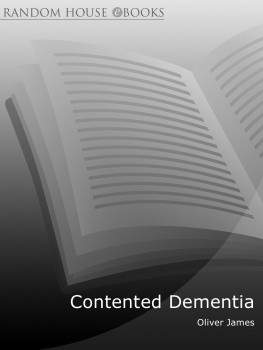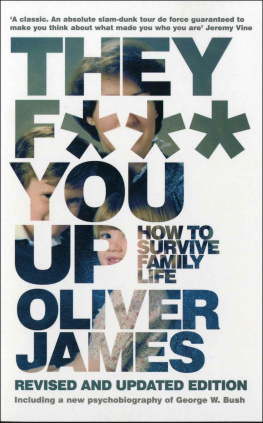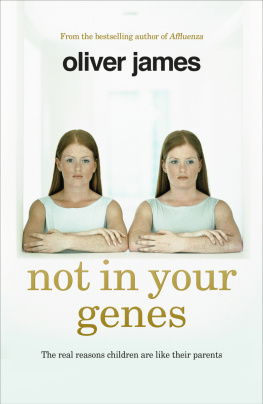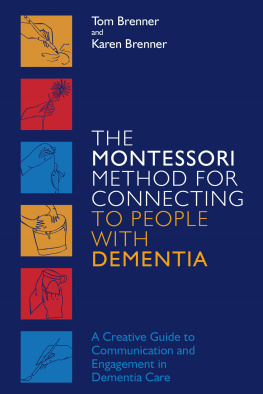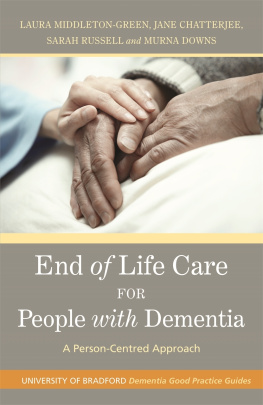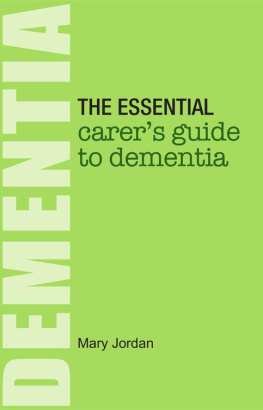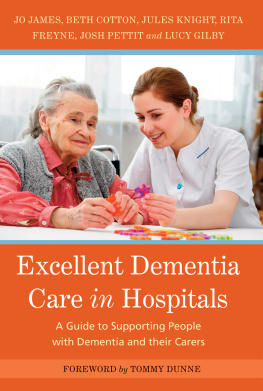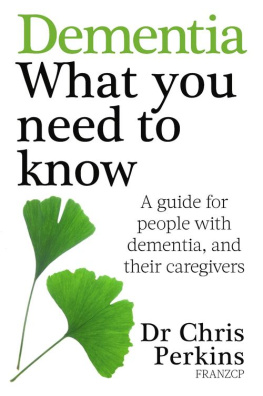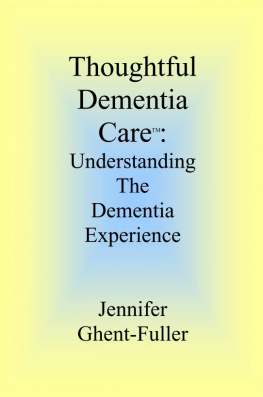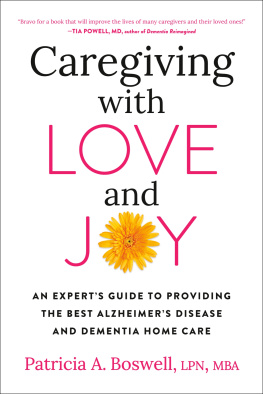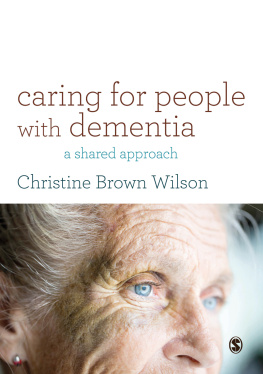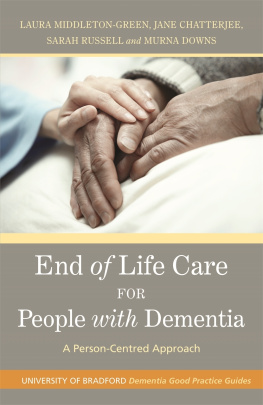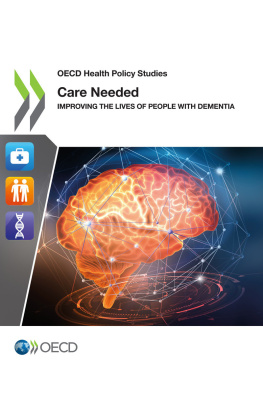CONTENTS
About the Book
Dementia is a little understood and currently incurable illness, but much can be done to maximise the quality of life for people with the condition. Contented Dementia by clinical psychologist and bestselling author Oliver James outlines a groundbreaking and practical method for managing dementia that will allow both sufferer and carer to maintain the highest possible quality of life, throughout every stage of the illness.
A person with dementia will experience random and increasingly frequent memory blanks relating to recent events. Feelings, however, remain intact, as do memories of past events and both can be used in a special way to substitute for more recent information that has been lost. The SPECAL method (Specialized Early Care for Alzheimer's) outlined in this book works by creating links between past memories and the routine activities of daily life in the present.
Drawing on real-life examples and user-friendly tried-and-tested methods, Contented Dementia provides essential information and guidance for carers, relatives and professionals.
About the Author
Oliver James trained and practised as a clinical child psychologist and, since 1988, has worked as a writer, journalist, broadcaster and television documentary producer and presenter. He is a trustee of the Alzheimer's charity, SPECAL and lives in Oxfordshire with his wife and two small children.
Also by Oliver James
Juvenile Violence in a WinnerLoser Culture
Britain on the Couch
They F*** You Up
Affluenza
The Selfish Capitalist
For further information about Oliver James and his work see:
www.oliver-james-books.com
Praise for Contented Dementia
reveals how a revolutionary new way of treating dementia brings amazing benefits for patients and carers alike This is no clever-dick philosophising
Guardian
an indispensable handbook for anyone coping with the effects of dementia and who wants to keep a sufferer as happy as is humanly possible can give a dementia patient a profound sense of wellbeing, along with a blissful lack of awareness of all the things that they can no longer do halts the emotional shutdown
Daily Express
explains a revolutionary way to care for dementia patients tender techniques that can ease absent minds
Telegraph
I found myself weeping offers a loving and accepting way of interacting with people in this state Its an important book for carers and people with more advanced dementia and the advice is also relevant for earlier stages could make life easier and gentler for everyone involved
You magazine
takes the reader into the world of the self, and the way the disease strips away the memory, dignity, and hope [James] shows that dementia need not be a nightmare of frustration and embarrassment The book is a radical plea to move beyond an approach that is dependent on medicine and leaves people befuddled and doped
Church Times
aimed at helping patients and carers manage the distressing and debilitating effects of dementia [its] remarkably simple The resulting well-being can last a lifetime
Yours magazine
To Dorothy
An Open Letter from Penelope Garner, Inventor of the Method Described in this Book, for Readers who have been Diagnosed as Having Dementia
Dear Reader,
If you have been diagnosed with dementia and have picked up this book, this is a letter specially for you.
You are the expert in a most extraordinary subject dementia. Your memory is behaving quite strangely and letting you down. You know what its like to be slightly out of step in a way that is sometimes difficult to describe.
This book is designed for other people to learn what you already know, so that they can help rather than hinder your progress through life.
Here, below, are a few tips specially for you. Stick to these, and you can safely leave everything else in the hands of the person you trust most.
- From now on please dont worry about the future stay with what you already know and love.
- Appoint the person you most trust as your advocate and ask them to read this book while you get on with your life.
- Forget all about the diagnosis youre very good at forgetting now, so use this skill to forget about dementia and get on with enjoying your life once more.
If you take these tips to heart you have nothing to fear. Be confident, go with the flow and leave all the work to someone else.
With Very Best Wishes,
Penelope Garner
Introduction
The idea of dementia sends a chill down the spine, like no other ailment.
Media coverage is uniformly pessimistic. Dramas and documentaries on television depict a gradual disintegration into non-existence; the press chronicles horror stories. Alas, this only reflects the reality of most sufferers and their carers. As the first slips of short-term memory begin to be undeniable and unmistakable, an emotional Hades beckons, because at present there is no cure and the conventional management of the illness holds out no hope of well-being. When Terry Pratchett, Britains bestselling fiction writer, recently gave a press conference to announce he is in the early stages of the illness at the young age of 59, he said he envied his fathers death through cancer. To him, Alzheimers was like stripping away your living self a bit at a time a nasty disease, surrounded by shadows and small, largely unseen tragedies.
Until I met my mother-in-law, Penny Garner, I would have assumed the same. Today, I know that the disability created by dementia does not have to be hellish, that it truly is possible to create well-being for the rest of the persons life, if you use her method for managing it.
Penny was a Cotswold housewife without a university degree when she got started, nearly twenty years ago. The inspiration was the dementia of her mother, Dorothy. This single case taught her all the fundamental skills she needed. She went on to develop them working with older people at the community hospital in Burford, Oxfordshire, initially as an Alzheimers Society helper. Through painstaking observation of what helped and what distressed the patients, she put the pieces of her theory together and turned them into a unique practice. In 1997, the work of SPECAL was described by the Alzheimers Society as a very impressive demonstration of person-centred care and a unique service with a model emphasis on highly individualised, person-centred care. When the National Health Service sought to sell Burford Hospital in 2002, Penny persuaded a benefactor to provide the funds which enabled her charity SPECAL (Specialized Early Care for Alzheimers) to buy the hospital site so that her work could continue. Today, SPECAL is an internationally admired centre of excellence.
Over a period of a year, I observed Penny teaching her method to carers and professionals, and I interviewed her extensively. This book is an attempt to make the SPECAL method available to anyone who cares for a person with dementia. In particular, I hope it helps their spouses, partners, offspring and siblings, some of whom will be full-time, live-in carers, others orchestrating care from a distance. Whatever your precise role, you will probably feel foreboding, despair and exhaustion. Worst of all you may feel you have suffered a bereavement: the person you once knew does not seem to be there any more. But I hope that by the end of the book you will see that, however advanced the illness, the real person who means so much to you is still there. This is Pennys revelation: that a great deal of the mind and emotional self of the person with dementia is still functioning as well as it ever did.
Next page
